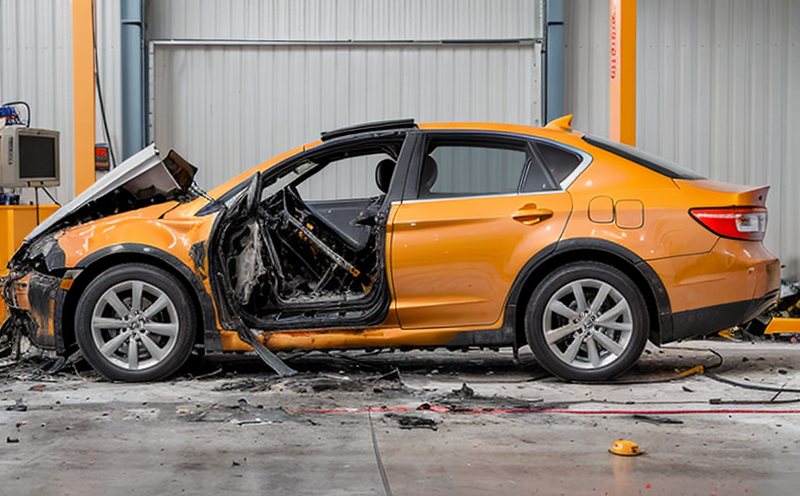IEEE 1881 Mechanical Abuse Testing of Stationary Battery Systems
The IEEE Standard 1881-2015, titled Mechanical Abuse Testing for Stationary Lithium-Ion Batteries (LIBs), provides a standardized approach to testing the mechanical abuse resistance of stationary battery systems. This service ensures that manufacturers and suppliers can evaluate their products' ability to withstand various abusive conditions without compromising safety or performance.
Stationary batteries, such as those used in data centers, telecommunications infrastructure, and renewable energy storage solutions, are designed for long-term operation with minimal maintenance. However, under extreme conditions like high-impact drops, overcharging, short-circuiting, or exposure to fire, these systems may experience mechanical abuse that can lead to failure.
The IEEE 1881-2015 standard focuses on several key aspects:
- High-drop testing: Ensures the battery system remains intact after being dropped from a specified height.
- Overcharge and short-circuit tests: Validates that the battery can handle overcharging or short-circuits without damage.
- Thermal abuse testing: Evaluates the battery's response to extreme temperature changes, including exposure to fire.
The test protocol is designed to simulate real-world scenarios where stationary batteries might encounter mechanical stress. By adhering to this standard, manufacturers can ensure their products meet stringent safety and performance criteria before being deployed in critical applications.
Our laboratory employs state-of-the-art equipment and experienced personnel to conduct these tests rigorously. We provide comprehensive reports detailing the results of each test, including any deviations from expected behavior and recommendations for improvement where necessary.
The IEEE 1881-2015 standard is particularly relevant in today's rapidly evolving renewable energy landscape, where safety and reliability are paramount. By leveraging this standard, organizations can build trust with their customers and stakeholders while maintaining high standards of quality and compliance.
Industry Applications
The IEEE 1881 Mechanical Abuse Testing service is applicable across multiple sectors, including renewable energy storage, data centers, telecommunications infrastructure, and electric vehicle charging stations. In these environments, stationary batteries play a crucial role in ensuring continuous power supply and efficient operation.
- Renewable Energy: Ensures that large-scale battery systems used for grid stabilization can withstand harsh environmental conditions without compromising safety or performance.
- Data Centers: Provides peace of mind regarding the reliability of backup power sources, especially in critical environments where downtime is not an option.
- Rail and Transportation: Supports the development of electric vehicle charging stations that meet stringent safety standards.
By conducting rigorous mechanical abuse testing according to IEEE 1881-2015, companies can ensure their products are ready for deployment in demanding environments. This not only enhances product reliability but also helps organizations comply with regulatory requirements and industry best practices.
Customer Impact and Satisfaction
The IEEE 1881 Mechanical Abuse Testing service has a direct impact on customer satisfaction by ensuring that stationary battery systems are robust, reliable, and safe. Here's how our testing contributes to this:
- Enhanced Product Reliability: By identifying potential weaknesses early in the development process, we help manufacturers develop more durable products.
- Increased Customer Trust: Compliance with international standards like IEEE 1881-2015 builds confidence among end-users and stakeholders.
- Reduced Risk of Failure: Our testing helps prevent costly failures in the field, which can lead to downtime or even accidents.
In addition to these tangible benefits, we also offer a range of support services that enhance customer satisfaction. These include:
- Detailed reports providing actionable insights for improvement.
- Training sessions on how to interpret test results and implement best practices.
- Consultation services tailored to specific industry needs.
Our goal is to provide not just a testing service but also a comprehensive support package that helps our customers achieve their quality and compliance objectives efficiently and effectively.
Competitive Advantage and Market Impact
The IEEE 1881 Mechanical Abuse Testing service offers significant competitive advantages by helping organizations stay ahead of regulatory requirements and industry trends. Here’s how:
- Regulatory Compliance: Our testing ensures that products comply with international standards, opening up new markets for our clients.
- Innovation Support: By identifying areas for improvement early in the development process, we help organizations innovate and improve their products.
- Market Differentiation: Compliance with stringent safety and performance criteria can differentiate a company’s offerings from those of competitors.
The IEEE 1881 Mechanical Abuse Testing service also has a broader market impact by:
- Contributing to safer, more reliable energy storage systems.
- Promoting the adoption of renewable energy technologies through enhanced product performance and safety.
- Supporting the growth of electric vehicle infrastructure with robust charging solutions.
In an increasingly competitive market, these advantages can provide a significant edge for organizations committed to excellence in quality and compliance.





